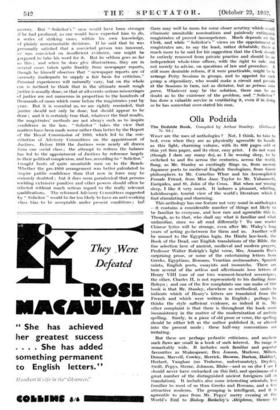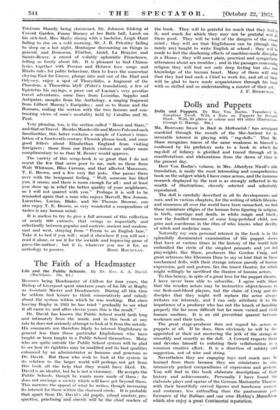011a Po drida
WHAT are the uses of anthologies ? Not, I think, to take to bed, even when they are as physically agreeable to handle as this light, charming volume, with its 800 pages odd of thin yet firm paper, and its clear, easy print. I do not want (though I dare say many do), as I lie wooing sleep, to be switched to and fro across the centuries, across the world, flung, as Mr. Stanley so excitingly flings us, from ancient Japanese poets to medieval English theologians, from Greek philosophers. to Mr. Cornelius Whur and his Accomplish'd Female Friend, from Miss Jane Taylor to Mr. Yakamoehi, Euripides, and St. John of the Cross. But when not wooing sleep, I like it very much. It induces a pleasant, whirling, kaleidoscopic, tourist view of the world's literature which I find stimulating and charming.
This anthology has one feature not very usual in anthologies —it contains a considerable number of things not likely to be familiar to everyone, and how rare and agreeable this is. Though, as to that, who shall say what is familiar and what unfamiliar, since we all read differently ? To one reader Chinese lyrics will be strange, even after Mr. Waley's long years of acting go-between for them and us. Another will be unused to the Egyptian logia, the Hindu law-book, the Book of the Dead, our English translations of the Bible, the fine selection here of ancient, medieval and modern prayers, Professor Walter Raleigh's light verse, Mrs. Amanda Ros's surprising prose, or some of the entertaining letters from Greeks, Egyptians, Romans, Venetian ,ambassadors, Spanish saints, English poets, essayists and monarchs. There are here several of the artless and affectionate love letters of Henry VIII (one of our two warmest-hearted sovereigns ; the other, Charles II, is not represented) to his darling Anne Boleyn ; and one of the few complaints one can make of this book is that Mr. Stanley, elsewhere so methodical, omits to indicate which of Henry's letters are translated from the French and which were written in English ; perhaps he thinks the style sufficient evidence, as indeed it is. My other complaint is that there is throughout the book some inconsistency in the matter of the modernization of archaic spelling. Surely, in a piece of old prose or verse, the spelling should be either left as the author published it, or altered into the present mode ; these half-way conventions are irritating.
But these are perhaps pedantic criticisms, and anyhow such flaws are small in a book of such interest. Its range is remarkably wide. It includes such familiar and popular favourites as Shakespeare, Ben Jonson, Marlowe, Milton, Donne, Marvell, Cowley, Herrick, Browne, Burton, Hiakluyt, Herbert, Vaughan (no Traherne, unfortunately), Dryden, Swift, Pepys, Sterne, Johnson, Blake—and so on (for I see I z'hould never have embarked on this list), and specimens of a great number of the distinguished ancient foreigners (all in translation). It includes also some interesting orientals, less familiar to most of us than Greeks and Romans, and a few attractive moderns. The grouping is intelligent, and it i4 agreeable to pass from Mr. Pepys' merry evening at the World's End to Bishop Ilatkeley's Aliiphrtm; thence- to
Tristram Shandy being christened, Dr. Johnson frisking at Covent Garden, Fanny Burney at her Bath ball, Lamb on his sick-bed, Miss Matty dining with a bachelor, Leigh Hunt failing to rise on a cold morning, Mr. J. B. Priestley failing to sleep on a hot night, Montaigne discoursing on things in general, and Rousseau, Eerielon, Amiel, La Bruyere and Sainte-Beuve, _a crowd of volubly aphoristic Frenchmen, telling us firmly about life. It is pleasant to find Chinese lyrics together with Persian and Hebrew love songs and Hindu rules for polite behaviour, then to leave the somewhat cloying East for Greece, plunge into and out of the Iliad and Odyssey, enjoy a spot of Thucydides, a fragment of the Phaedrus, a Theocrittis idyll (Pater'S translation), a few of Epietetus his sayings, a piece out of Lucian's very peculiar travel adventures, some lines from Leonidas, Sappho and Antipater, samples from the Anthology, a singing fragment from Gilbert Murray's Euripides ; and so to Rome and the Romans, ending the section with the two famous and con- trasting views of man's mortality held by Catullus and St. Paul.
Very pleasing, too, is the section called " Moon and Stars," and that on Travel. Besides Mandeville and Marco Polo and such familiarities, this latter contains a sample of Caxton's trans- lation of a fourteenth-century Flemish phrase-book, and some good letters about Elizabethan England from visiting foreigners ; those from our Dutch visitors are rather more complimentary to us than M. Renier would approve.
The variety of this scrap-book is so great that I do not resent the few that seem poor to me, such as those from Walt Whitman, Bliss Carman, and that affected Manxman, T. E. Brown, and a few very flat jests. One passes them over with the benignant feeling. _" Well, someone has liked you, it seems, and there is room enough for all ; and at least you show up in relief the better quality of your neighbours, so I will not quarrel with you." Perhaps it is well to be reminded again that a man NVho enjoys-Marvell, Ben Jonson, Lucretius, Lucian, Blake, and Sir Thomas Browne, can also enjoy T. E. Brown, so very wonderful a compendium of tastes is any -human mind.
It is useless to try to give a full account of this collection of nearly 600 extracts, that swings so impartially and eclectically between popular and esoteric, ancient and modern, east and west, straying from " Persia to an English lane." Take it to bed if you will ; read it elsewhere if you,will not ; re ad it alone, or use it for the-sociable and improving game of guess-the-author ; but it is, whatever you use it for, an















































 Previous page
Previous page